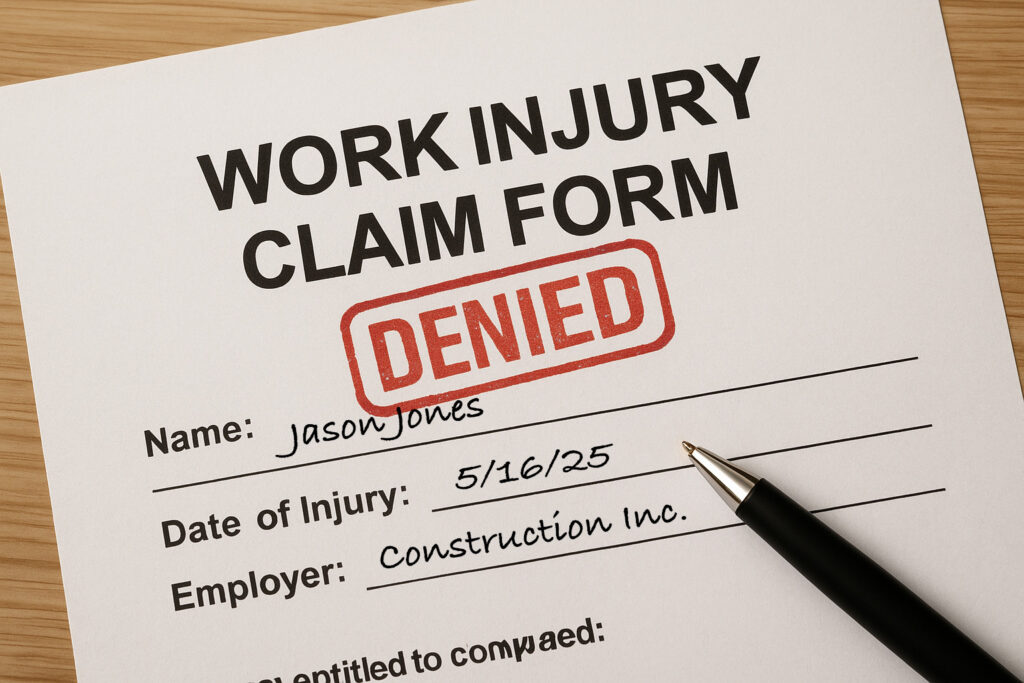
Receiving a denial on your workers’ compensation claim can be discouraging — especially when you’re already dealing with medical appointments, lost wages, and uncertainty about your future. But if your claim was denied by the Washington State Department of Labor and Industries (L&I) or a self-insured employer, it doesn’t necessarily mean your case is over.
Understanding the reasons for denial, knowing your rights, and taking quick action can help you get back on track. Here’s what to do if your claim is denied — and how to begin the appeals process effectively.
Why Workers’ Comp Claims Get Denied
Workers’ compensation claims in Washington may be denied for several reasons. Common causes include:
- Missing or incomplete medical documentation
- Disputes over whether the injury occurred at work
- Delayed reporting of the injury to your employer
- Pre-existing medical conditions
- Missed deadlines or incorrect forms
Sometimes, even valid claims are denied due to administrative errors or overly strict interpretations of the law by insurers or third-party administrators.
Step 1: Read the Denial Letter Carefully
After your claim is denied, you’ll receive a written decision from L&I or the self-insured employer. This document includes key information you need to review:
- The stated reason(s) for the denial
- The deadline for filing a protest or appeal
- Instructions for the next steps
You, your employer, and your doctor all have the right to protest any decision made about your Washington state L&I claim. L&I must receive a written protest within 60 calendar days of the date the decision was received (15 days for decisions about vocational benefits) or the decision becomes final.
Step 2: Organize Supporting Documents
If you choose to appeal the decision, gathering strong supporting evidence is essential. This may include:
- Medical records and diagnostic results
- Statements from your attending provider
- Results of any Independent Medical Examinations (IMEs)
- Workplace incident reports or witness testimony
- Payroll records, job descriptions, or vocational evaluations
Reviewing the denial with a qualified representative or legal professional can help identify what’s missing — or how to strengthen your case for appeal.
Step 3: File a Protest or Appeal
There are generally two main ways to challenge a denial:
- Protest: A written protest can be submitted directly to L&I. Protests are often the first step in addressing a disagreement. They are a way for individuals or businesses to formally challenge a decision and present additional information or arguments in support of their position.
- Appeal: An appeal is a more formal process. Appeals are heard by the Board of Industrial Insurance Appeals (BIIA), and may involve legal representation, hearings, and witness testimony.
Each route has its own procedures and deadlines. Choosing the right approach can make a significant difference in the outcome.
Step 4: Prepare for a Hearing
If your appeal moves forward to a hearing with the BIIA, you’ll appear before an industrial appeals judge. The hearing process may involve:
- Presenting evidence
- Calling medical or vocational experts
- Cross-examining employer witnesses
- Interpreting laws and procedural rules
Because these hearings are legal proceedings, many workers seek assistance from a legal advocate familiar with Washington’s workers’ compensation system.
Avoiding Common Mistakes After a Denial
When a claim is denied, it’s easy to feel frustrated — or to assume nothing more can be done. But avoid these common errors:
- Missing protest or appeal deadlines
- Neglecting to seek a second medical opinion
- Failing to respond to requests from L&I or the employer
- Accepting the denial without exploring your options
- Attempting to handle complex appeals without guidance
Acting quickly and seeking accurate information can increase your chances of success.
What Are Your Options Going Forward?
A denied claim doesn’t mean you’re not injured — or that you don’t qualify for benefits. Many workers successfully overturn initial denials after presenting additional evidence or clarifying medical documentation. You may still be entitled to:
- Medical treatment
- Time-loss compensation
- Vocational rehabilitation
- Permanent Partial Disability (PPD) awards
Some cases may also reveal additional legal claims involving employer retaliation or third-party liability.
Final Takeaway
If your Washington workers’ compensation claim is denied, you still have options. Understanding your rights, gathering appropriate evidence, and navigating the protest or appeal process are key steps to protecting your benefits.
For many workers, seeking support — whether from a union representative, a workers’ advocate, or a Seattle workers’ compensation lawyer — can help ensure that their claims are treated fairly and that no opportunities for compensation are missed.




